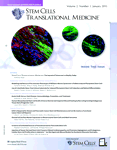 Duchenne muscular dystrophy (DMD), a rare genetic disorder, leads to muscle death and the formation of scar tissue due to a mutant copy of the dystrophin gene. Average DMD life expectancy is 25. While no cure exists, recent stem cell work in a mouse model reveals a possible therapy. Researchers led by Suzanne Berry-Miller generated aorta-derived mesoangioblast (ADM) stem cells and then injected the cells into the hearts of dystrophin-deficient mice. It was hypothesised that ADMs would restore dystrophin and alleviate or prevent dilated cardiomyopathy (DCM) in these animals. It was found that ADMs delay or prevent development of DCM in dystrophin-deficient heart, resulting in dystrophin expression, angiogenesis, stimulation of endogenous cardiac stem cell division, and the appearance of nestin+ cardiomyocytes of host origin. It was also found that timing of stem cell transplantation may be critical for achieving benefit with cell therapy in DMD cardiac muscle.
Duchenne muscular dystrophy (DMD), a rare genetic disorder, leads to muscle death and the formation of scar tissue due to a mutant copy of the dystrophin gene. Average DMD life expectancy is 25. While no cure exists, recent stem cell work in a mouse model reveals a possible therapy. Researchers led by Suzanne Berry-Miller generated aorta-derived mesoangioblast (ADM) stem cells and then injected the cells into the hearts of dystrophin-deficient mice. It was hypothesised that ADMs would restore dystrophin and alleviate or prevent dilated cardiomyopathy (DCM) in these animals. It was found that ADMs delay or prevent development of DCM in dystrophin-deficient heart, resulting in dystrophin expression, angiogenesis, stimulation of endogenous cardiac stem cell division, and the appearance of nestin+ cardiomyocytes of host origin. It was also found that timing of stem cell transplantation may be critical for achieving benefit with cell therapy in DMD cardiac muscle.
Injection of Vessel-Derived Stem Cells Prevents Dilated Cardiomyopathy and Promotes Angiogenesis and Endogenous Cardiac Stem Cell Proliferation in mdx/utrn−/− but Not Aged mdx Mouse Models for Duchenne Muscular Dystrophy. Ju Lan Chun, Robert O’Brien, Min Ho Song, et al. Stem Cells Trans Med 2013.
